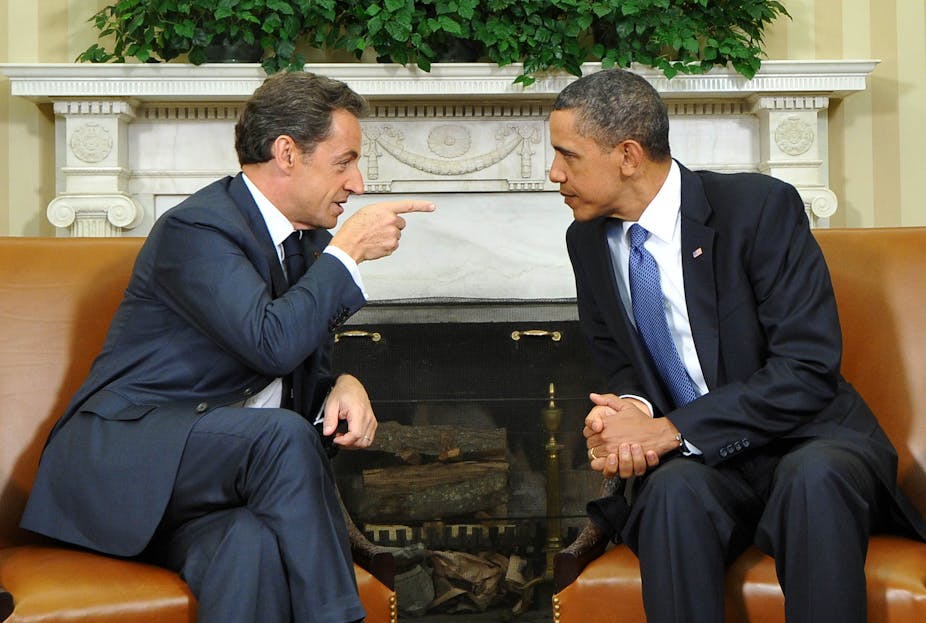The Security Council’s Resolution authorising the use of ‘all necessary measures’ to protect Libyan civilians and civilian populated areas (number 1973, March 17) confirms the intention of the United States to seek an international mandate for the use of force and shows the Council’s willingness to apply the doctrine of the Responsibility to Protect.
But these positive trends should not be exaggerated. They are also fragile.
The Obama Administration has restored an atmosphere of international cooperation which allowed the US, France and the UK to obtain Council approval for the use of force against the Qadhafi régime in Operation Odyssey Dawn.
The Iraq legacy would undoubtedly have prevented the Bush Administration obtaining Council approval for such a use of force against another Muslim state. President Obama emphasised in Santiago on 21 March that the United States ensured ‘international legitimacy’ in obtaining a Council Mandate ‘because … in the past there have been times where the United States acted unilaterally or did not have full international support’.
But the significance of the US move to ‘international legitimacy’ should not be exaggerated. The Bush Administration had already made progress towards a more multilateral approach. The Council imposed strong sanctions under Chapter VII of the Charter on Iran and the DPRK under the second Bush Administration (but made it clear that it was not approving the use of force). It also approved the use of ‘all necessary means … to prevent attacks and threats against civilians’ in Darfur in Resolution 1706 of 31 August 2006.
The Obama Administration itself has not ruled out the unilateral use of force by the United States. Its National Security Strategy, released in May 2010, stated ‘the United States must reserve the right to act unilaterally to defend our nation and our interests’.
The sharply divided vote on Resolution 1973 shows the continuing difficulty in obtaining strong Council support for the use of force: two permanent Members, Russia and China, and three other powerful states, Brazil, Germany and India, abstained. Turkey, not a current Council member but a major Mediterranean Muslim majority State, has opposed the use of force against Libya.
This fragile support compares poorly with the substantial international consensus the first Bush Administration built around the use of force in the first Gulf War in 1990-91.
Operation Odyssey Dawn is a very significant application of the doctrine of the Responsibility to Protect.
The 2005 UN World Summit agreed that ‘we are prepared to take collective action …, through the Security Council…[when] national authorities are manifestly failing to protect their populations from genocide, war crimes, ethnic cleansing and crimes against humanity [collectively referred to as ‘mass atrocity crimes’].’
Resolution 1973 referred to this doctrine. But so did the Council’s 2006 Darfur Resolution without a successful outcome.
Operation Odyssey Dawn must succeed to show that R2P can be applied successfully. But what would constitute success?
The United States and its partners have correctly stressed that the mandate in Resolution 1973 is limited, as President Obama said on 21 March, to ‘humanitarian efforts’. He stressed that ‘we are going to make sure that we stick to that mandate’. At the same time, however, the President confirmed ‘that it is U.S. policy that Qadhafi needs to go’.
But the ‘success’ of Operation Odyssey Dawn does require Qadhafi’s departure. If he remains in power, the coalition operation will be perceived to have failed. The coalition would face the same problem that the United States faced in Iraq after the first Gulf War left Saddam Hussein in power. How long could the coalition legitimately continue the no fly zone over Libya to protect the Libyan population against Qadhafi?
If Operation Odyssey Dawn is to be a successful application of Responsibility to Protect, it must also be seen as legitimate. Responsibility to Protect does not require the use of force as a response to mass atrocity crimes but it does require a consistent and effective response to them. The United States must show that it is willing to respond effectively to the other uprisings of the Arab Spring, particularly in Bahrain. Bahrain’s violent suppression of peaceful Shiite protesters on March 16 was a crime against humanity. US National Security Advisor Tom Donilon said on 21 March that Bahrain ‘is just a very different circumstance than Libya’. Apart from the United States’ critical military and political interests in Bahrain, it is not.
If Qadhafi does fall, but as just another tyrant who annoyed the US once too often, Responsibility to Protect will not protect the Libyan people, or any other people such as the Shiiite population of Bahrain, against future mass atrocity crimes.

